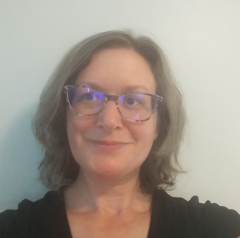Education
BA, Criminology, Simon Fraser University
MA, Sociology, Concordia University
PhD, Sociology, Carleton University
About

Lisa joined the Department of Sociology at Douglas College in 2015 and finds great joy in pursuing her passion for research and teaching. Her research areas are: gender, sex, sexual and reproductive health; social aspects of menstruation/menstrual cycle; gender, sex, and technology; sexual violence, consent, and post-secondary institutions; community-engaged and applied sociology. Lisa is a devoted and passionate educator and scholar, who remains actively engaged within her community and many of her projects involve collaborations with grassroots and not-for-profit organizations. From time to time, she dabbles in podcasting and other kinds of creative endeavours as a means to extend beyond conventional forms of academic publishing and knowledge dissemination.
Lisa is the Coordinator of the Menstrual Cycle Research Group at Douglas College, where she has several active research programs and engages in community advocacy and supports student and community-based researchers. She is a Co-Investigator on a SSHRC partnership grant, led by Dr. Shaheen Shariff, McGill University, entitled: iMPACTS: Collaborations to Address Sexual Violence on Campus.
In her downtime, Lisa loves a good long walk in the forest or strumming away on the ukulele.
Tel: 604 527 5561
Email: lsmith65@douglascollege.ca
Office: N3310
Research areas
Gender, sex, sexual and reproductive health; Social aspects of menstruation/menstrual cycle; Gender, sex, and technology; Sexual violence, consent, and post-secondary institutions; Community-engaged and applied sociology
Links
https://www.douglascollege.ca/about-douglas/learn-about-douglas/research-college/research-centres/menstrual-cycle-research-group
https://www.douglascollege.ca/about-douglas/learn-about-douglas/research-college/research-centres/impacts
Courses taught
SOCI 1125 Introduction to Sociology
SOCI 1145 Canadian Society
SOCI 2240 Women in Society
SOCI 2260: Introduction to Social Research
SOCI 2280: Sociology of Health and Illness
SOCI 2290 Society, Tech, Inequality
SOCI 3385 Social Control and Surveillance
Current research
Walking alongside trauma: Understanding secondary trauma through craft and art, funded by SSHRC, Collaborations to Address Sexual Violence, P.I. Dr. Shaheen Shariff, McGill University
Menstrual equity and period poverty in Canada: Current knowledge and future research directions, Funding from Women and Gender Equality Canada and a Research Project Grant, Douglas College
Learning in novel times: Tracing the social impacts of COVID-19 on students, funded by SSHRC, Collaborations to Address Sexual Violence, P.I. Dr. Shaheen Shariff, McGill University
Menstrual pains of imprisonment: Reproductive health in Canadian prisons, Funding from Research Project Grant, Douglas College
Periods in-between: Menstruation and sexual stigma amongst second-generation South Asian immigrants
Selected recent publications
Smith, Lisa and Francesca Scala (editors). Forthcoming Fall 2025. Northern Blood: Menstruation Activism and Politics in Canada. McGill-Queen’s University Press.
Cheema, Iqra Shagufta, Jennifer Jill Fellows, and Lisa Smith (editors). February 2025. “Ruptures, resistance, reclamation: Transnational feminisms in a digital age.” Atlantis 46 (1).
Khan, Zeba, Niki Ovesi, and Lisa Smith. 2024. “The role of community-based organizations in promoting menstrual health through menstrual product distribution: A qualitative investigation.” Women’s Reproductive Health 1-18. https://doi.org/10.1080/23293691.2024.2421491.
Smith, L., Gacimi, R., Adolph, N., Hope, J. (forthcoming). Flow of inequity: Period poverty and the COVID-19 pandemic. Navigating Mental Health, Wellness, and Social Challenges during COVID-19, Shaheen Shariff (ed.). Peter Lang.
Smith, L., Gacimi, R. 2023. Bloody burdens: Post-secondary students and menstruation management on campus. Atlantis, 43(1), 32-44.
Fellows, J., Smith, L. (editors). 2022. Gender, Sex, and Tech! An Intersectional Feminist Guide. Canadian Scholars/Women’s Press.
Smith, L. 2022. Bikes, birth control, and baby bottles. Gender, Sex, Tech! An Intersectional Feminist Guide, Jill Fellows, Lisa Smith (eds.). Canadian Scholars/Women’s Press.
Smith, Lisa. 2022. Review of Musings on Menopause and Perimenopause: Identity, Experience, Transition editors Heather Dillaway and Laura Wershler. Canadian Journal on Aging.
Tribe, S., Smith, L. 2021. Post-Secondary Periods: Results from the Period Product Access Project. Douglas College Menstrual Research Group.
Smith, L. 2021. Research. Period. A podcast about research about menstruation. - 4 episodes
Smith, L., Paterson, S. 2018. Guiding girls: Navigating neo-liberal subjectivity and government educational resources for young women. Girlhood Studies, 11(2): 13-29.